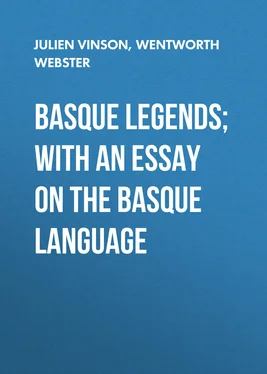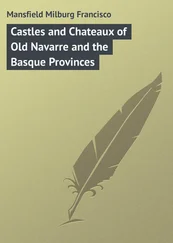Julien Vinson - Basque Legends; With an Essay on the Basque Language
Здесь есть возможность читать онлайн «Julien Vinson - Basque Legends; With an Essay on the Basque Language» — ознакомительный отрывок электронной книги совершенно бесплатно, а после прочтения отрывка купить полную версию. В некоторых случаях можно слушать аудио, скачать через торрент в формате fb2 и присутствует краткое содержание. Жанр: foreign_antique, Старинная литература, Мифы. Легенды. Эпос, на английском языке. Описание произведения, (предисловие) а так же отзывы посетителей доступны на портале библиотеки ЛибКат.
- Название:Basque Legends; With an Essay on the Basque Language
- Автор:
- Жанр:
- Год:неизвестен
- ISBN:нет данных
- Рейтинг книги:3 / 5. Голосов: 1
-
Избранное:Добавить в избранное
- Отзывы:
-
Ваша оценка:
- 60
- 1
- 2
- 3
- 4
- 5
Basque Legends; With an Essay on the Basque Language: краткое содержание, описание и аннотация
Предлагаем к чтению аннотацию, описание, краткое содержание или предисловие (зависит от того, что написал сам автор книги «Basque Legends; With an Essay on the Basque Language»). Если вы не нашли необходимую информацию о книге — напишите в комментариях, мы постараемся отыскать её.
Basque Legends; With an Essay on the Basque Language — читать онлайн ознакомительный отрывок
Ниже представлен текст книги, разбитый по страницам. Система сохранения места последней прочитанной страницы, позволяет с удобством читать онлайн бесплатно книгу «Basque Legends; With an Essay on the Basque Language», без необходимости каждый раз заново искать на чём Вы остановились. Поставьте закладку, и сможете в любой момент перейти на страницу, на которой закончили чтение.
Интервал:
Закладка:
“You see that it has really happened as I told you—he has not eaten you.”
“No, but to-morrow he will eat me. How can it be otherwise?”
“No, no! To-morrow you will bring me my dinner again. Some help will come to you.”
The next day Petit Yorge goes off at eight o’clock to the Tartaro, who gives him a new horse, a different dress, and a fine sword. At ten o’clock he arrives where the young lady is. He bids her open the door. But she says to him that she cannot in any way open fourteen doors; she is there, and that she cannot open them, and he should go away; that it is enough for one to be eaten; that she is grieved to see him there. As soon as he has touched them with his sword, the fourteen doors fly open. He sits down by the side of the young lady, and tells her to look behind his ear, for it hurts him. At the same time he cuts off fourteen bits of the fourteen dresses she was wearing. As soon as he had done that, the serpent comes, saying joyfully,
“I shall eat not one, but three.”
Petit Yorge says to him, “Not even one of us.”
He leaps on his horse, and begins to fight with the serpent. The serpent makes some terrible bounds. After having fought a long time, at last Petit Yorge is the conqueror. He cuts off one head, and the horse another with his foot. The serpent begs quarter till the next day. Petit Yorge grants it, and the serpent goes away.
The young lady wishes to take the young man home, to show him to her father; but he will not go by any means. He tells her that he must go to Rome, and set off that very day; that he has made a vow, but that to-morrow he will send his cousin, who is very bold, and is afraid of nothing.
The young lady goes to her father’s, Petit Yorge to his garden. Her father is delighted, and cannot comprehend it at all. The young lady goes again with the dinner. The gardener says to her,
“You see you have come again to-day, as I told you. To-morrow you will come again, just the same.”
“I should be very glad of it.”
On the morrow Petit Yorge went off at eight o’clock to the Tartaro. He said to him that the serpent had still three heads to be cut off, and that he had still need of all his help. The Tartaro said to him,
“Keep quiet, keep quiet; you will conquer him.”
He gives him a new dress, finer than the others, a more spirited horse, a terrible dog, 26 26 The three days’ fight, and the dog, appear in Campbell’s “Tale of the Sea-Maiden,” Vol. I., pp. 77–79.
a sword, and a bottle of good scented water. 27 27 The Basque word usually means “Eau de Cologne.”
He said to him,
“The serpent will say to you, ‘Ah! if I had a spark between my head and my tail, how I would burn you and your lady, and your horse and your dog.’ And you, you will say to him then, ‘I, if I had the good-scented water to smell, I would cut off a head from thee, the horse another, and the dog another.’ You will give this bottle to the young lady, who will place it in her bosom, and, at the very moment you shall say that, she must throw some in your face, and on the horse and on the dog as well.”
He goes off then without fear, because the Tartaro had given him this assurance. He comes then to the carriage. The young lady says to him,
“Where are you going? The serpent will be here directly. It is enough if he eats me.”
He says to her, “Open the door.”
She tells him that it is impossible; that there are twenty-one doors. This young man touches them with his sword, and they open of themselves. This young man says to her, giving her the bottle,
“When the serpent shall say, ‘If I had a spark between my head and my tail, I would burn you,’ I shall say to him, ‘If I had a drop of the good-scented water under my nose;’ you will take the bottle, and throw some over me in a moment.”
He then makes her look into his ear, and, while she is looking, he cuts off twenty-one pieces from her twenty-one dresses that she was wearing. At the same moment comes the serpent, saying, with joy,
“Instead of one, I shall have four to eat.”
The young man said to him,
“And you shall not touch one of us, at any rate.”
He leaps on his spirited horse, and they fight more fiercely than ever. The horse leaped as high as a house, and the serpent, in a rage, says to him,
“If I had a spark of fire between my tail and my head, I would burn you and your lady, and this horse and this terrible dog.”
The young man says,
“I, if I had the good-scented water under my nose, I would cut off one of your heads, and the horse another, and the dog another.”
As he said that, the young lady jumps up, opens the bottle, and very cleverly throws the water just where it was wanted. The young man cuts off a head with his sword, his horse another, and the dog another; and thus they make an end of the serpent. This young man takes the seven tongues with him, and throws away the heads. Judge of the joy of this young lady. She wanted to go straight to her father with her preserver (she says), that her father must thank him too; that he owes his daughter to him. But the young man says to her that it is altogether impossible for him; that he must go and meet his cousin at Rome; that they have made a vow, and that, on their return, all three will come to her father’s house.
The young lady is vexed, but she goes off without losing time to tell her father what has happened. The father is very glad that the serpent was utterly destroyed; and he proclaims in all the country that he who has killed the serpent should come forward with the proofs of it.
The young lady goes again with the dinner to the gardener. He says to her,
“I told you true, then, that you would not be eaten? Something has, then, killed the serpent?”
She relates to him what had taken place.
But, lo! some days afterwards there appeared a black charcoal-burner, who said that he had killed the serpent, and was come to claim the reward. When the young lady saw the charcoal-burner, she said immediately, that most certainly it was not he; that it was a fine gentleman, on horseback, and not a pest of a man like him. The charcoal-burner shows the heads of the serpent; and the king says that, in truth, this must be the man. The king had only one word to say, she must marry him. The young lady says, she will not at all; and the father began to compel her, (saying) that no other man came forward. But, as the daughter would not consent, to make a delay, the king proclaims in all the country, that he who killed the serpent would be capable of doing something else, too, and that, on such a day, all the young men should assemble, that he would hang a diamond ring from a bell, and that whosoever riding under it should pierce the ring with his sword, should certainly have his daughter. 28 28 This is a much better game than the ordinary one of tilting at a ring with a lance, and is a much more severe test of horsemanship. The ring, an ordinary lady’s ring, is suspended by a thread from a cross-bar, at such a height that a man can just reach it by standing in his stirrups. Whoever, starting from a given point, can put a porcupine’s quill, or a small reed, through the ring, and thus carry it off at a hand-gallop, becomes possessor of the ring. We have seen this game played at Monte Video, in South America; and even the Gauchos considered it a test of good horsemanship. Formerly, it seems, the ring was suspended from the tongue of a bell, which would be set ringing when the ring was carried away. The sword, of course, was the finest rapier.
From all sides arrive the young men. Our Petit Yorge goes off to the Tartaro, and tells him what has happened, and that he has again need of him. The Tartaro gives him a handsome horse, a superb dress, and a splendid sword. Equipped thus, Petit Yorge goes with the others. He gets ready. The young lady recognizes him immediately, and says so to her father. He has the good luck to carry off the ring on his sword; but he does not stop at all, but goes off galloping as hard as his horse can go. The king and his daughter were in a balcony, looking on at all these gentlemen. They saw that he still went on. The young lady says to her father:
Читать дальшеИнтервал:
Закладка:
Похожие книги на «Basque Legends; With an Essay on the Basque Language»
Представляем Вашему вниманию похожие книги на «Basque Legends; With an Essay on the Basque Language» списком для выбора. Мы отобрали схожую по названию и смыслу литературу в надежде предоставить читателям больше вариантов отыскать новые, интересные, ещё непрочитанные произведения.
Обсуждение, отзывы о книге «Basque Legends; With an Essay on the Basque Language» и просто собственные мнения читателей. Оставьте ваши комментарии, напишите, что Вы думаете о произведении, его смысле или главных героях. Укажите что конкретно понравилось, а что нет, и почему Вы так считаете.












